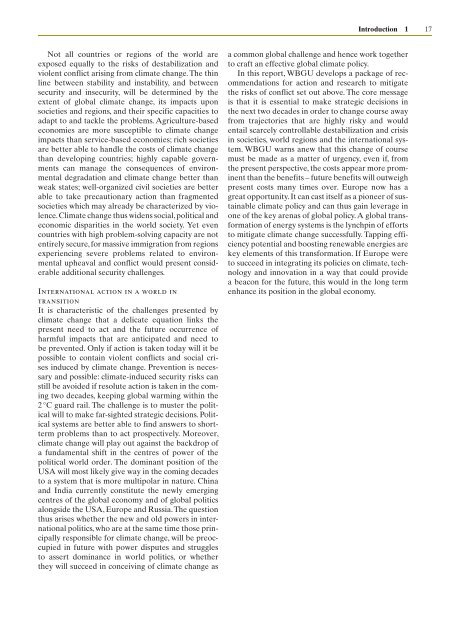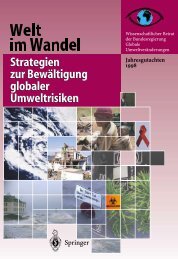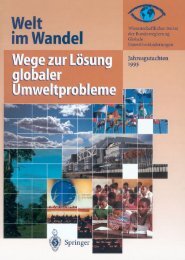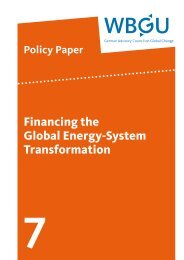World in Transition: Climate Change as a Security Risk - WBGU
World in Transition: Climate Change as a Security Risk - WBGU
World in Transition: Climate Change as a Security Risk - WBGU
You also want an ePaper? Increase the reach of your titles
YUMPU automatically turns print PDFs into web optimized ePapers that Google loves.
Not all countries or regions of the world are<br />
exposed equally to the risks of destabilization and<br />
violent conflict aris<strong>in</strong>g from climate change. The th<strong>in</strong><br />
l<strong>in</strong>e between stability and <strong>in</strong>stability, and between<br />
security and <strong>in</strong>security, will be determ<strong>in</strong>ed by the<br />
extent of global climate change, its impacts upon<br />
societies and regions, and their specific capacities to<br />
adapt to and tackle the problems. Agriculture-b<strong>as</strong>ed<br />
economies are more susceptible to climate change<br />
impacts than service-b<strong>as</strong>ed economies; rich societies<br />
are better able to handle the costs of climate change<br />
than develop<strong>in</strong>g countries; highly capable governments<br />
can manage the consequences of environmental<br />
degradation and climate change better than<br />
weak states; well-organized civil societies are better<br />
able to take precautionary action than fragmented<br />
societies which may already be characterized by violence.<br />
<strong>Climate</strong> change thus widens social, political and<br />
economic disparities <strong>in</strong> the world society. Yet even<br />
countries with high problem-solv<strong>in</strong>g capacity are not<br />
entirely secure, for m<strong>as</strong>sive immigration from regions<br />
experienc<strong>in</strong>g severe problems related to environmental<br />
upheaval and conflict would present considerable<br />
additional security challenges.<br />
International action <strong>in</strong> a world <strong>in</strong><br />
transition<br />
It is characteristic of the challenges presented by<br />
climate change that a delicate equation l<strong>in</strong>ks the<br />
present need to act and the future occurrence of<br />
harmful impacts that are anticipated and need to<br />
be prevented. Only if action is taken today will it be<br />
possible to conta<strong>in</strong> violent conflicts and social crises<br />
<strong>in</strong>duced by climate change. Prevention is necessary<br />
and possible: climate-<strong>in</strong>duced security risks can<br />
still be avoided if resolute action is taken <strong>in</strong> the com<strong>in</strong>g<br />
two decades, keep<strong>in</strong>g global warm<strong>in</strong>g with<strong>in</strong> the<br />
2 °C guard rail. The challenge is to muster the political<br />
will to make far-sighted strategic decisions. Political<br />
systems are better able to f<strong>in</strong>d answers to shortterm<br />
problems than to act prospectively. Moreover,<br />
climate change will play out aga<strong>in</strong>st the backdrop of<br />
a fundamental shift <strong>in</strong> the centres of power of the<br />
political world order. The dom<strong>in</strong>ant position of the<br />
USA will most likely give way <strong>in</strong> the com<strong>in</strong>g decades<br />
to a system that is more multipolar <strong>in</strong> nature. Ch<strong>in</strong>a<br />
and India currently constitute the newly emerg<strong>in</strong>g<br />
centres of the global economy and of global politics<br />
alongside the USA, Europe and Russia. The question<br />
thus arises whether the new and old powers <strong>in</strong> <strong>in</strong>ternational<br />
politics, who are at the same time those pr<strong>in</strong>cipally<br />
responsible for climate change, will be preoccupied<br />
<strong>in</strong> future with power disputes and struggles<br />
to <strong>as</strong>sert dom<strong>in</strong>ance <strong>in</strong> world politics, or whether<br />
they will succeed <strong>in</strong> conceiv<strong>in</strong>g of climate change <strong>as</strong><br />
Introduction 1<br />
a common global challenge and hence work together<br />
to craft an effective global climate policy.<br />
In this report, <strong>WBGU</strong> develops a package of recommendations<br />
for action and research to mitigate<br />
the risks of conflict set out above. The core message<br />
is that it is essential to make strategic decisions <strong>in</strong><br />
the next two decades <strong>in</strong> order to change course away<br />
from trajectories that are highly risky and would<br />
entail scarcely controllable destabilization and crisis<br />
<strong>in</strong> societies, world regions and the <strong>in</strong>ternational system.<br />
<strong>WBGU</strong> warns anew that this change of course<br />
must be made <strong>as</strong> a matter of urgency, even if, from<br />
the present perspective, the costs appear more prom<strong>in</strong>ent<br />
than the benefits – future benefits will outweigh<br />
present costs many times over. Europe now h<strong>as</strong> a<br />
great opportunity. It can c<strong>as</strong>t itself <strong>as</strong> a pioneer of susta<strong>in</strong>able<br />
climate policy and can thus ga<strong>in</strong> leverage <strong>in</strong><br />
one of the key aren<strong>as</strong> of global policy. A global transformation<br />
of energy systems is the lynchp<strong>in</strong> of efforts<br />
to mitigate climate change successfully. Tapp<strong>in</strong>g efficiency<br />
potential and boost<strong>in</strong>g renewable energies are<br />
key elements of this transformation. If Europe were<br />
to succeed <strong>in</strong> <strong>in</strong>tegrat<strong>in</strong>g its policies on climate, technology<br />
and <strong>in</strong>novation <strong>in</strong> a way that could provide<br />
a beacon for the future, this would <strong>in</strong> the long term<br />
enhance its position <strong>in</strong> the global economy.<br />
17
















